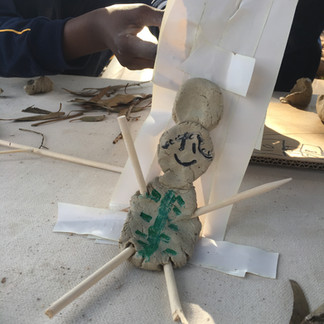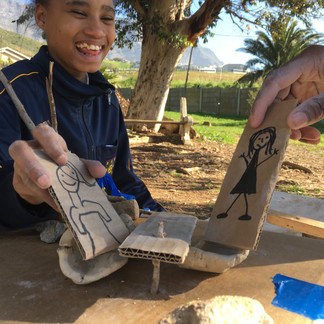PLAY LIKE A GIRL!
- x
- Sep 10, 2019
- 3 min read
COLLABORATIVE PLAYGROUND DESIGN
PROJECT INTRODUCTION
See Saw Do strongly supports the notion of children as active citizens within a social, city and spatial context.
Conjointly, as active citizens, children should be encouraged to develop and practice their personal agency pertaining to all levels of decision making.
“Children are citizens, now!” - Unicef
The focus of See Saw Do’s work stems from our core value that designing spaces is a collaborative process, involving a myriad of stakeholders to ensure efficiently beautiful spaces that serves the end user, well.
Having been involved with the Zonnebloem College Estate for 2 years, has provided us with the opportunity to gain in depth insights into the spatial culture, spatial usage and spatial needs of the property. In addition to encouraging agency and active participation in the design process we actuate to weave more holistic play opportunities into the learner’s time that they spend on the school grounds.
Drawing from a decade of hands on projects, relating to designing child friendly spaces and promoting play - we purposefully planned a set of workshops that combines both these elements. The result of which was a twice a week, four-week set of play promoting interventions with a diverse age-group of girls. Aptly, being womxn’s month during August, we titled the activations “Play Like a Girl”.
The desired outcome through collaborating with the female students through a series of activities, was to cultivate a safe and embracing environment where all participants could share their ideas, thoughts and dreams of what they envision a great playground play space on their property (designed by children for children) can be?
THE IMPORTANCE OF PLAY / PROJECT MOTIVATION
“Most importantly, play is a source of happiness” - Peter Gray
Apart from play being fun, it is crucial in promoting healthy child development. Holistic playgrounds with a good balance of fixed and moveable infrastructure aids in emotional, physical, cognitive and social enrichment.
“It is through play that children at a very early age engage and interact in the world around them. Play allows children to create and explore a world they can master, conquering their fears while practicing adult roles, sometimes in conjunction with other children or adult caregivers. As they master their world, play helps children develop new competencies that lead to enhanced confidence and the resiliency they will need to face future challenges. Undirected play allows children to learn how to work in groups, to share, to negotiate, to resolve conflicts, and to learn self-advocacy skills. When play is allowed to be child driven, children practice decision-making skills, move at their own pace, discover their own areas of interest, and ultimately engage fully in the passions they wish to pursue. Perhaps above all, play is a simple joy that is a cherished part of childhood. - Kenneth Ginsburg
Modern society often barres children from play. For more than 50 years, play time has been slowly declining, and it is keeping them from turning into confident adults.
“This lack of play affects emotional development, leading to the rise of anxiety, depression, and problems of attention and self control.” - American Journal for Play
Albeit being aware of magnitude of impediments to play, we are at the same time activists for, as Woodstock the little bird from the Peanuts fame said: “small is beautiful”. Hence, we work alongside stakeholders and strive towards creating small sustainable changes and interventions with the intention of growing our network of influence and implementors as time inevitably marches on.
The video below will take you on a playground extravaganza tour. Enjoy!















Comments